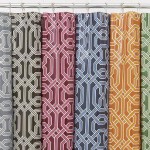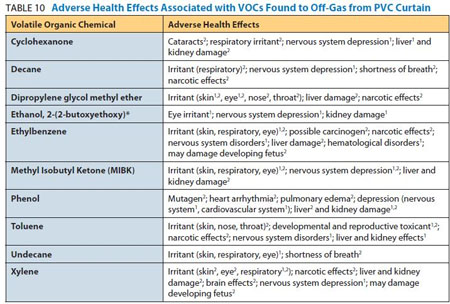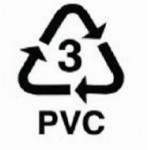 The twentieth century was the age of plastics. Tens of thousands of new synthetic materials promised prosperity and comfort. Polyesters, polyvinyls, high impact polystyrenes, who could resist these triumphs of modern technology and the conveniences they offered? Only now are we starting to realize their costs to human health and the environment. Volatile Vinyl: The New Shower Curtain’s Chemical Smell is a recent study of vinyl shower curtains by the eco-watch group Environmental Defence. It raises new questions about the safety of welcoming toxic chemicals into our homes.
The twentieth century was the age of plastics. Tens of thousands of new synthetic materials promised prosperity and comfort. Polyesters, polyvinyls, high impact polystyrenes, who could resist these triumphs of modern technology and the conveniences they offered? Only now are we starting to realize their costs to human health and the environment. Volatile Vinyl: The New Shower Curtain’s Chemical Smell is a recent study of vinyl shower curtains by the eco-watch group Environmental Defence. It raises new questions about the safety of welcoming toxic chemicals into our homes.
Five different brands of PVC vinyl shower curtains were studied. Testing conducted at an independent facility in Marietta, Georgia found dangerous levels of at least 108 chemicals known as “volatile organic compounds’.
Effects of Volatile Organic Compounds
Concentrations of harmful chemicals reached levels up to 16 times higher than the standards recommended by the United States Green Building Council. Some potential health effects of these chemicals include: eye, nose, and throat irritation; headaches, loss of coordination, nausea; damage to the liver, kidney, and central nervous system; and cancer. Moreover, PVC products often are made using hormone disrupting chemicals called phthalates which make PVCs soft and pliant.

The good news is that levels of chemicals off-gassing from the tested shower curtains tapered off over time. After 28 days, emissions of most of the chemicals were reduced to negligible levels. The bad news is that shower curtains are not the only source of PVCs in our homes. Thousands of products, including children’s toys, food containers, and clothing contain PVCs. The combined emissions from these products may accumulate in your home poisoning you and your family. Indoor air pollution is rated among the top cancer causing risks by Health Canada. You can identify many PVC containing products by looking  for the three arrows triangle symbol found on many products. If the symbol contains the number 3, it is made from PVC.
for the three arrows triangle symbol found on many products. If the symbol contains the number 3, it is made from PVC.
Other studies (PDF) have confirmed that the toxic effects of PVCs are not restricted to what they bring into your home. Throughout the production cycle of PVCs, they pose dangerous hazard to humans and the environment. Global PVC production uses 700 million tons of mercury. Cancer causing bi-products including dioxins and vinyl chlorides pollute groundwater supplies, poisoning workers and their communities. PVC products are slow to decompose and contaminate landfills for centuries to come.
Fortunately, for shower curtains at least, new options are coming. Ikea has already switched to non-PVC plastic alternatives, and many retailers are following suit. Products made from recycled plastics, with the plastic triangle symbol “1”, are better alternatives. A somewhat pricier option is to look for curtains made from organic hemp or cotton. At Dream Designs or Raw Organic you can order organ curtains for about eighty dollars. Expensive, perhaps but their hemp products do not attract mould and are environmentally safe. Greenyour.com offers several recommendations. Click here to see some of the advantages and disadvantages of greener shower curtain options.
The Centre for Environmental Health and Justice also provides a guide to avoiding PVCs in a wide range of products. This guide is oriented for the American market, so some of their recommendations may not be available in Canada. As well Greenpeace produces a Green Electronics Guide to help you avoid PVCs.
Meanwhile, it is important to show your support for phasing out these dangerous compounds from shower curtains and other household products. Send a message to the federal Health Minister and federal Environment Minister. Let them know that you want to them to eliminate this chemical in everyday products.



Recent Comments